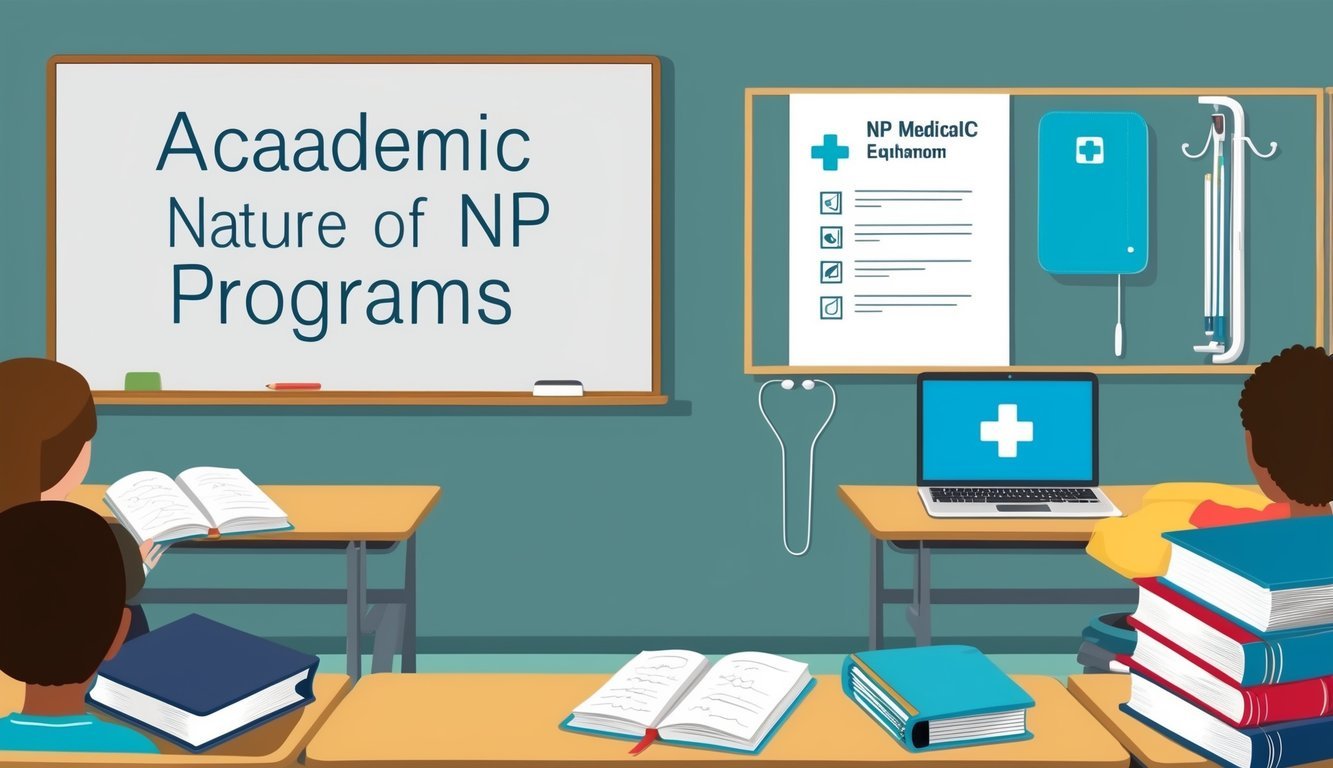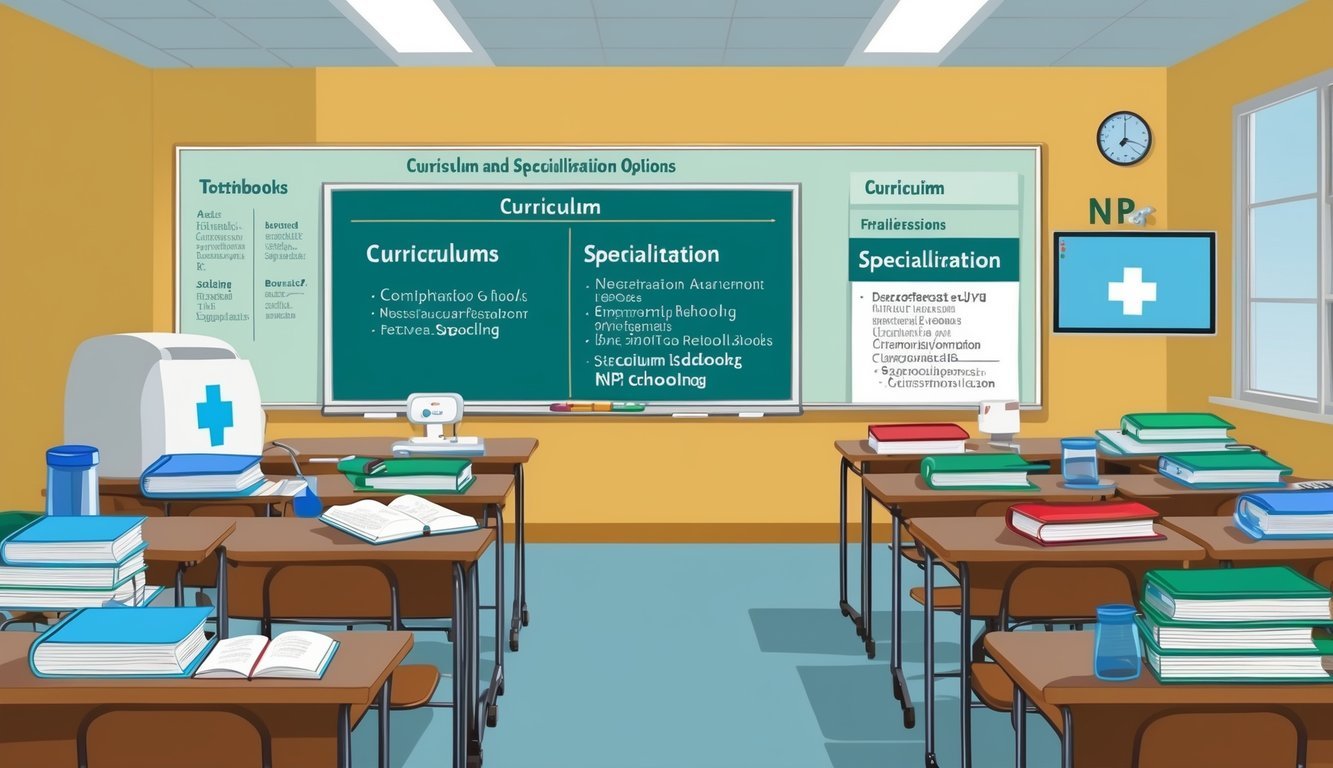Navigating the path to becoming a nurse practitioner (NP) can feel daunting, especially when considering the educational requirements. Completing nurse practitioner school typically takes 5 to 7 years.
This timeline accounts for obtaining a Bachelor of Science in Nursing (BSN) or an associate degree, gaining registered nurse (RN) experience, and completing a master’s level NP program.
Your specific journey may vary based on the type of program you choose and your prior education.
For instance, if you enter as a registered nurse with a BSN, you may find yourself completing your NP training more quickly than someone starting from scratch.
As you explore further, consider the requirements, program types, and specialty options that will shape your experience.
Knowing how long it will take can help you set realistic goals for your career in nursing.
You can find detailed insights about the process here.
Overview of Nurse Practitioner Education

The path to becoming a nurse practitioner (NP) involves a series of educational steps, certifications, and practical experiences.
Understanding the nuances of nurse practitioner education will help you navigate this journey effectively.
Defining the Role of a Nurse Practitioner
A nurse practitioner is an advanced practice registered nurse (APRN) who provides comprehensive care to patients.
NPs possess the authority to diagnose conditions, interpret diagnostic tests, and initiate treatment plans.
They can also write prescriptions, allowing them to manage patient care independently.
Nurse practitioners often work in various healthcare settings, including hospitals, clinics, and private practices.
Their role is vital in filling healthcare gaps, especially in underserved areas.
With a focus on health promotion and disease prevention, NPs play an essential part in improving patient outcomes.
Various Paths to Becoming an NP
To become a nurse practitioner, you must first become a registered nurse (RN), which can typically be achieved through an Associate Degree in Nursing (ADN) or a Bachelor of Science in Nursing (BSN).
After obtaining your RN license, you can pursue a graduate nursing program.
Common paths include:
- Master of Science in Nursing (MSN): This program usually takes two years and prepares you for NP roles.
- Doctor of Nursing Practice (DNP): A more advanced degree, the DNP often takes an additional one to two years and is focused on leadership and clinical expertise.
The choice depends on your career goals and desired level of clinical responsibility.
Understanding these options can guide you in selecting the right educational trajectory.
Understanding the Levels of Nursing Education
Nursing education comprises several levels, each with specific requirements and outcomes.
Here’s a breakdown of the typical educational paths:
| Nursing Degree | Duration | Description |
|---|---|---|
| Associate Degree in Nursing (ADN) | 2-3 years | Prepares for RN licensure, focuses on basic nursing skills. |
| Bachelor of Science in Nursing (BSN) | 4 years | Offers a more comprehensive education, including theory and clinical practice. |
| Master of Science in Nursing (MSN) | 2 years (post-BSN) | Prepares for NP roles, advanced clinical training, and specialized knowledge. |
| Doctor of Nursing Practice (DNP) | 1-2 years (post-MSN) | Emphasizes practice-focused leadership and clinical expertise. |
Each level of education expands your knowledge and skills, which is essential for a successful career as a nurse practitioner.
Consider your interests and career goals when deciding on your nursing education path.
Pre-Requisites and Admissions for NP Programs

Entering a Nurse Practitioner (NP) program requires meeting specific prerequisites and successfully navigating the admissions process.
Understanding these requirements is crucial to ensuring you are prepared for this advanced nursing path.
Undergraduate Requirements
To qualify for NP programs, you typically need a Bachelor of Science in Nursing (BSN) or an equivalent degree. Registered Nurses (RNs) with an Associate Degree in Nursing (ADN) may also apply, but they often need to complete a BSN before enrolling in NP programs.
A minimum GPA—usually around 3.0—is required in most programs.
Additionally, you must hold an active, unencumbered RN license.
Some schools may request evidence of nursing experience or clinical exposure.
This experience is vital for understanding the complexities of patient care and supporting your application.
Graduate Program Criteria
Once you’ve met the undergraduate requirements, you can focus on the graduate program criteria.
Many NP programs require a completed application that includes:
- Transcripts: Showcasing academic performance.
- Letters of Recommendation: Typically from nursing professionals or educators who can attest to your skills and character.
- Statement of Purpose: Discussing your career goals and motivations for becoming an NP.
Programs may also ask for standardized test scores like the GRE, although this requirement varies widely.
Clinical experience in specific areas, such as pediatrics or geriatrics, may enhance your application as well.
Components of a Strong Application
To create a standout application, consider these essential components:
- Relevant Nursing Experience: Highlight any specialized roles or responsibilities carried out in clinical settings.
- Strong Recommendations: Secure letters from individuals who understand your capabilities and work ethic.
- Professional Development: Include certifications or workshops that demonstrate your commitment to nursing and continuous learning.
A well-rounded application that showcases your education, experience, and professional aspirations will make you a competitive candidate.
Each element contributes to forming a comprehensive profile that admissions committees review carefully.
For detailed requirements, visit Nurse Practitioner School Requirements.
Curriculum and Specializations in NP Schooling

The curriculum in nurse practitioner (NP) schooling is designed to provide a comprehensive foundation in advanced nursing practice.
It includes rigorous coursework alongside hands-on clinical training.
You will encounter various specializations that cater to a wide range of patient needs and healthcare settings.
Core Courses and Clinical Training
In NP programs, core courses cover essential topics in health assessment, pharmacology, physiology, and pathophysiology.
These are vital for building the knowledge necessary to assess and manage patient care effectively.
You will engage in clinical training through supervised practicums, where you practice diagnosing and implementing treatment plans.
These experiences often occur in diverse settings, such as hospitals, outpatient clinics, and community health environments.
Your training may focus on specific populations, emphasizing areas like disease prevention and health promotion.
Through these core courses, you develop skills to manage care across different age groups and health conditions.
Choosing a Specialization
Choosing a specialization is crucial in your NP education.
Popular areas include family nurse practitioner, pediatric nurse practitioner, and women’s health.
Each specialty prepares you for different patient demographics and clinical responsibilities.
For instance, if you pursue acute care, your training will emphasize critical care skills for patients with serious health conditions.
Alternatively, if you focus on adult-gerontology primary care, you will learn to manage complex health issues in older adults.
Researching various specializations allows you to align your career goals with your interests and strengths.
Consider clinical demand and personal passion when making this decision.
Advanced Practice Areas
Advanced practice areas in NP schooling include diverse fields such as nursing education and chronic care management.
Each specialization requires advanced knowledge and skill sets tailored to specific patient populations.
For instance, you may choose to specialize in gerontology, addressing the healthcare needs of elderly individuals.
Alternatively, pediatrics focuses on the unique aspects of child health.
Regardless of the path you choose, these advanced practice areas prepare you to deliver comprehensive healthcare solutions.
You will learn not just about diagnosis but also about treatment plans tailored to meet the needs of your specific patient population.
Explore various advanced practice options to ensure a fulfilling career in nursing that meets both personal and professional aspirations.
Licensure and Certification

Obtaining licensure and certification is critical for your career as a Nurse Practitioner (NP).
These processes ensure that you meet the standards required to provide safe and competent care.
You will need to complete examinations and meet specific state requirements to practice as a licensed NP.
Examination and Credentials
To begin the process, you must pass a national certification exam.
This typically includes the Family Nurse Practitioner (FNP), Adult-Gerontology Nurse Practitioner (AGNP), or other specialized certifications.
The American Nurses Credentialing Center (ANCC) and the American Association of Nurse Practitioners (AANP) offer recognized certification exams.
You will need to register for your chosen exam and undergo a thorough review of content areas.
This ensures you are well-prepared to demonstrate your knowledge and skills in patient care.
After passing the exam, you will receive credentials indicating your status as a certified NP.
State Licensure Requirements
Each state has its own licensure requirements, which you must satisfy after obtaining certification.
Generally, you will need to apply for licensure through your state’s Board of Nursing (BON).
Key requirements typically include:
- Proof of Certification: You must present your national certification to the BON.
- Background Check: A criminal background check is often required.
- Application Fee: Most states charge a fee to process your application.
Wait times for processing can vary, with typical durations ranging from 8 to 12 weeks depending on your state.
Maintaining Certification
Maintaining your NP certification is essential and involves ongoing education.
Most certifying bodies require you to complete continuing education (CE) credits every few years.
For instance, the ANCC necessitates:
- 75 CE credits every 5 years.
- Submission of a renewal application and fee.
Additionally, you must keep your state licensure current, which often requires proof of continuing education as well.
Staying informed about your state’s specific requirements is crucial for your career longevity.
For more guidance, refer to resources like the ANCC for certification details and updates on requirements.
Career Opportunities and Advancement

As a nurse practitioner (NP), you will find a range of employment prospects across various clinical settings.
Your career can lead to diverse specialties, with salary expectations reflecting your experience and area of focus.
Additionally, opportunities for continuing education and advancement are plentiful, allowing you to further enhance your qualifications.
Employment Prospects and Settings
The demand for nurse practitioners is on the rise.
According to the Bureau of Labor Statistics, the job outlook for NPs is projected to grow by 28% from 2021 to 2031, significantly faster than the average for all occupations.
You can work in multiple healthcare settings, including:
- Primary Care: Focus on preventive care and chronic disease management.
- Acute Care: Provide immediate care in hospitals or emergency departments.
- Specialty Areas: Such as pediatrics or geriatrics, which provide tailored healthcare services.
These varied settings make NPs vital healthcare providers in a rapidly evolving healthcare landscape.
Salary Expectations
Factors such as specialty and location can affect nurse practitioners’ compensation.
As of 2023, the average salary for NPs is approximately $126,260.
However, some roles offer higher earnings potential.
For instance, emergency nurse practitioners earn around $135,453.
Here’s a basic overview:
| Specialty | Average Salary |
|---|---|
| Primary Care | $115,000 |
| Family Nurse Practitioner | $120,000 |
| Acute Care Nurse Practitioner | $130,000 |
| Emergency Nurse Practitioner | $135,453 |
These figures indicate the lucrative nature of the profession, driven by your expertise and the growing demand for healthcare services.
Continuing Education and Advancement
Continuing education plays a crucial role in your career as an NP.
Engaging in advanced practice nursing through graduate programs helps refine your skills.
It may also lead to certification in specialized areas.
You can pursue various avenues for advancement, such as:
- Certification: Acquire credentials in areas like pediatric or family practice.
- Leadership Roles: Move into management within healthcare facilities.
- Research and Education: Contribute to nursing education or healthcare research.
By actively pursuing professional development, you enhance your career while positively impacting patient care and healthcare services.

